Wednesday, 21 February 2024
If you are looking for pioneers in the German zero waste movement you'll find one of them in Dresden's Neustadt neighbourhood:
Bring a selection of glasses, containers and bags and stop by Lose ("loose-weight"), a cosy zero-waste corner store in Böhmische Straße. Unlike other package-free supermarkets this one does not only sell dry food, natural body care and household chemicals but also offers veges and has a cheese counter. Although most of the products are organic some are not, so you might want to check the labels on the suspenders for the bio keyword or ask.
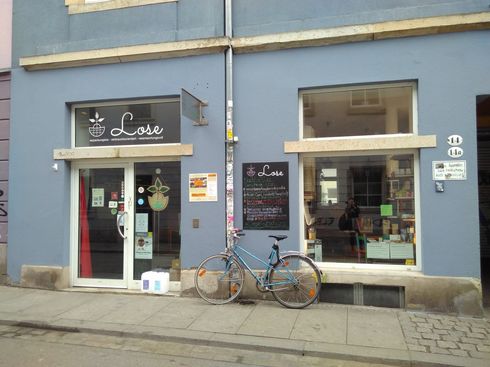
The interior of the shop was refurbished and is now much lighter and seems spacier than before. The reason for this is that the coffee corner which had been there before the corona pandemic has decreased and the serviced counter for bakery products, cheeses, antipasti and coffee moved from the entrance area to the backpart of the shop. Mind you: like other package-free shops Lose does not have an illuminated window front, so be brave to try the door handle – the place may look quite dark even when open.
Supermarkets with zero-waste stations
Moreover all shops of the co-operatively organised local wholesale chain VG Biomarkt offer a good selection of loose-weight organic dry goods (in addition to an abundance of often locally produced fruit and veges and dairy products and drinks of all kinds in returnable glass bottles).
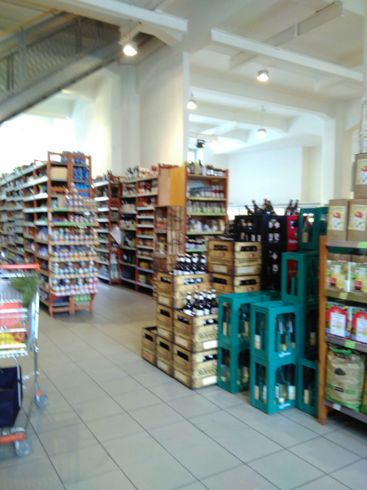
Their main shop is located near
Bahnhof Mitte train station, an entire organic warehouse on the premises of a former newspaper printing plant. Standing back from the main street the first floor is occupied by an organic convenience store supporting your zero-waste efforts. On the second floor there's a well assorted organic fashion store mainly for babies, children and women, with a section offering organic body care, household chemicals, sustainably produced toys, stationary and more.
For members prices are lower, but the shop is open to everyone.
On weekdays the self-service bistro directly facing the street offers delicious lunch (only snacks on Saturdays), and there's a cafe cum bakery shop featuring young local artists.
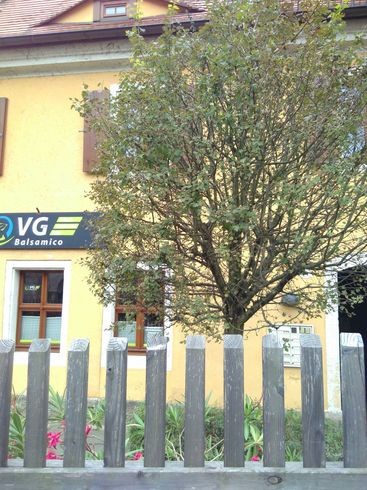
VG Biomarkt also has branches in the neighbourhoods of Neustadt (Hechtviertel), Striesen, Johannstadt, Strehlen, and Loschwitz,
Mind you that the one in Striesen, at Polandplatz isn't easy to find: Opposite the triangular park there's a driveway which one can easily miss as no sign at the entrance points to the shop. Be brave an move past, you'll find the shoü at the right hand site.
If you want to return empties, find the appropriate crate in the entrance area, pin down its code, tell the cashier and put the glass or bottle at the appropriate place.
The Loschwitz branch dubbed VG Balsamico is conveniently located
opposite the downhill station of the cable-run suspension railway ("Schwebebahn") next to
Körnerplatz at the northern end of Blaues Wunder ("blue wonder") bridge.
Opening hours and assortment (of loose-weight products as of products in returnable glasses) vary depending on the size of the market and the neighbourhood. However, all VG markets offer free drinking water refill stations and you can book cargo bikes to transport your purchase home free of charge.
While many organic groceries were closing, the Verbrauchergemeinschaft opened a new large supermarket with attached self-service restaurant cum cafe in 2023: The
VG Friedensstraße offers and abundance of loose weight and unpackaged products. Want to shop products grown or made in the vicinity? Watch out for the green "RP" ("regional partner") logo.
While these local groceries were early adopters a number of nation-wide operating organic supermarket chains have been following. In Dresden the two remaining branches of the Berlin-based supermarket chain Bio Company introduced dry food suspenders for use with your own jars.
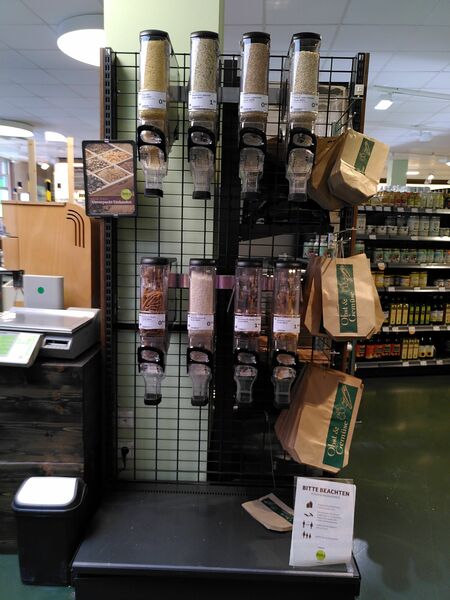
In 2021 the Denns Biomarkt was the first branch of this chain where I found a dedicated shelf with fairly traded dry food in retour glasses and a few gravity bins with nuts, seeds, rice and noodles. A start at least, although I have my doubts that this small selection will be sufficient to nudge people towards the extra effort it takes to bring along glasses and jars.
Without offering gravity bins the Vorwerk Podemus farm supermarkets supports package-free efforts, too: Hand over your own clean boxes and bags when buying meat and meat products, cheese, bread, rolls or cake from the services counter, and prefer returnable glass bottles and glasses when choosing jogurt, honey and jams.
Farmshops and factory outlets
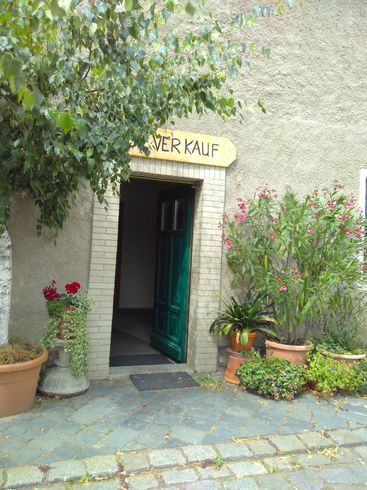
When you take the Elberadweg bicycle route on the southern shore in direction Niederwartha you'll pass a nice old farmyard, the organic Bauernhof Franz in Niedergohlis. It runs a subscription scheme – phone in or e-mail your order until Wednesday and collect it from the farmshop on Fridays and Saturdays, but if you happen to step by on one of these days and there's someone around you may be able to buy vegetable oil and perhaps also potatoes or other produce from the farm. But of course, shopping their farm products from one of the VG supermarkets might be easier.
In 2022 Vegannett, a Weißer Hirsch-based producer of vegan spreads, started filling products in standardized returnable deposit glasses which
you can buy directly from the manufacturer on Wednesdays.
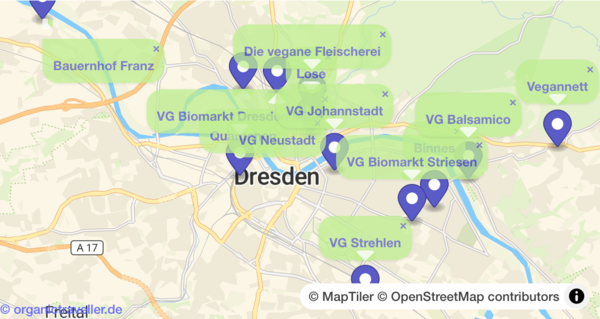
More to try
For more vegan alternatives to cheese, meat and sausages head for
Die vegane Fleischerei in the Neustadt. January, 2023 a vegan "butcher shop" opened here, and they assured me that all of their products are made from predominantly organic ingredients.
They also offer ready-made "meat" salads and soups, and I'm looking forward to visit the shop in person. Don't forget to take boxes and jars with you.
Closed
2024-02-21 04:00:00
[Dresden, Neustadt, organic, coffee, vegan, zero_waste, unverpackt, cafe, grocery, market, supermarkets, bodycare, household, hemp]
Link

Wednesday, 10 January 2024
As a university city Trondheim has had a few places offering partially organic lunch for almost a generation, both, of the home-made vegetarian food kind, and those with a fine dining approach. Some of the pioneers closed their kitchens quite recently, others re-opened in larger locations after a closing period and fostered an entire cluster of restaurants based on ingredients from organic farms in the greater region. Coffee houses and cafes serving fairly traded coffee drinks with organic milk have been coming and going, but if you put a little effort in where to go you will find both, places for a quick coffee or sandwich, places to have a great time with friends, and inspiring eating experiences.
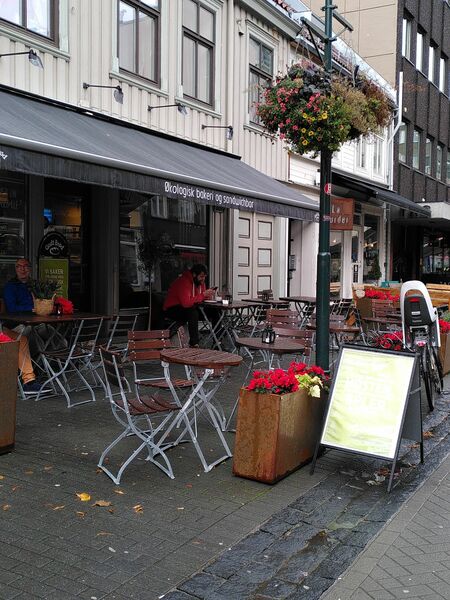
For a lunch or breakfast sandwich head for the cafe in the backroom of the organic Godt Brød bakery near Nordre gate,
one of the pioneers of organic food in Norway. Choose the filling of your sandwich or savory bread roll (all ingredients except the Italian-style salami cut are organic), have a decent coffee drink (the milk is organic), tea, a sweet organic bread roll ("bolle"), and/or an organic juice (e.g. from the nearby Rotvoll juicery in Ranheim which has its own organic grocery on their premises). About half of the cold drinks are not organic, so check for the "økologisk" keyword. During the warm season, treat yourself with a pre-packaged organic ice-cream from Reins Kloster. Everything is offered to take away, too. Notable fact for vegans: The dough for the sweet bread rolls is dairy-free, the bakery uses porridge made from oat and water and rapeseed oil instead of milk.
The company has expanded vastly in the past few years, with shop openings in Oslo (which by now also hosts the headquarter), Stavanger, Bergen and a few other places and last but not least at its birthplace: If you cannot find a spare seat in the cafe where it all began simply walk a few more steps to Dronningensgate. With its upmarket shop front it's the perfect place for a coffee date.
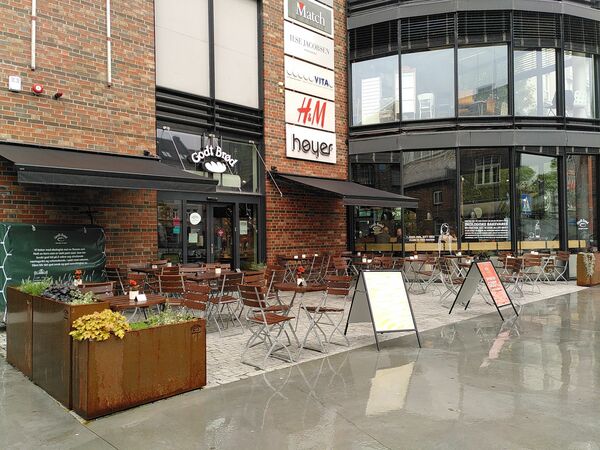
A short stroll over the bridge there's a third branch by the waterfront, inside the
Solsiden shopping mall with even longer opening hours. They have a spacious sitting area outdoor, although its use is limited due to the ever changing weather in Trondheim. Good to know: All Godt Brød branches accept anonymous payments without data traces, using cash.
Heartier food like organic egg and bacon for breakfast or lamb burgers for lunch or dinner, together with organic softdrinks can be had at Ramp Pub and Spiseri at Svartlamon. Vegetarian options are available. Service at this shabby-homely place may be a little slow, and not all of the ingredients are organic.
Formerly entirely furnished with formica tables and chairs the interior has improved since, but gentrification hasn't replaced the proletarian chic yet.
The kitchen closes at 9 pm.
Real organic food, vegan and vegetarian, is served at neighbourhood Cafe Stammen in Kongens gate. Unfortunately their opening hours are rather limited, so I haven't been able to pay a visit yet. Let me know about your experience if you happen to eat there before me.
Simple seasonal lunch with the little extra, home-made predominantly from produce of small-scale organic (though not necessarily certified) farms from the Trøndelag region, sourdough bread of traditional grains from the adjacent bakery, coffee and books, this is
Sellanraa next to the city library and Kunsthall museum. Unfortunately they do not serve dinner and are closed on Sundays.
Fine dining based on local organic produce started with restaurant Credo in an old narrow street in the city center of Trondheim many years ago. The place had to close, but after a break, master-mind and chef Heidi Bjerkan started anew on new, formerly industrial locations in Lilleby. There are now three restaurants for various budgets, and a bakery: fine dining at Credo, informal rustic brunch, lunch and dinner at Jossa, and ramen soups with a Norwegian touch at Edoramen, run
by different chefs who all share the love for unadultered, sustainable food.
However, Michelin-decorated Credo is going to close by the end of January, 2024, to re-open on the premises of the National Library in Oslo, during summer or autumn, 2024.
Let's hope that Jossa and Edoramen are going to survive without their mastermind.
All places are closed on Mondays and Tuesdays as well as during the Easter and X-Mas holidays.
At the airport
Airports generally aren't the place for a conscious lifestyle, but if you cannot avoid to fly from Trondheim Airport Værnes you may at least have an organic coffee past security at
Haven next to
gate 35.
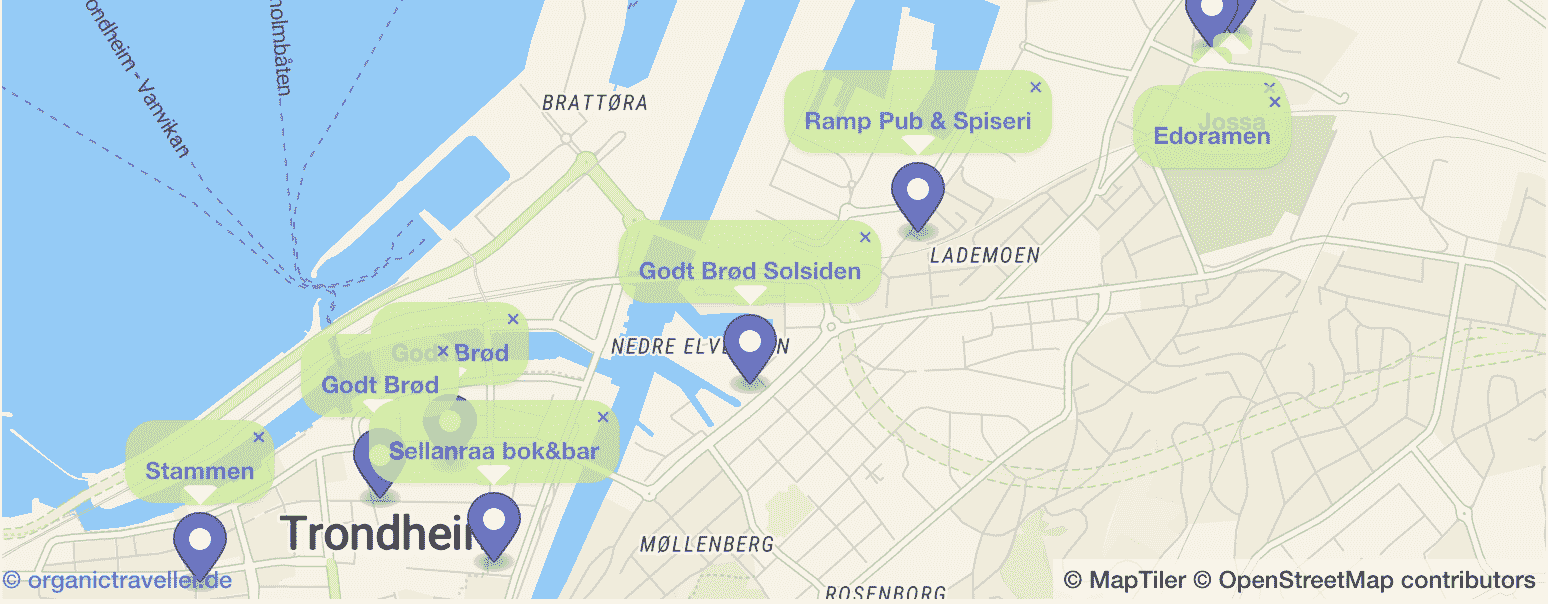
Permanently closed or no longer organic
The following places are either closed, with references remaining on the web, or ceased to offer organic items:
- Credo, Ørjaveita 4 (partially organic gourmet restaurant, re-opened on new location)
- Kafé Soil, Nedre Bakklandet 20d
- Makro Buffet og Restaurant, Prinsens gt. 4c (partially organic macrobiotic eatery)
- Trondheim Mathall, Prinsens gt. 30 (partially organic restaurant and delicatessen)
- Persilleriet, Erling Skakkes gt. 39 (one of the pioneers of organic vegetarian food in Trondheim, replaced by a vegan lunch bar, Erlings, where you perhaps also will find some organic items if you ask)
- Persilleriet St. Olavs Hospital, Olav Kyrres gt. 13
- Selma,
TMV kaia 13 (pizza)
- Dromedar Kaffebar (various places, do no longer have anything organic)
2024-01-10 21:00:00
[Trondheim, organic, fair, vegetarian, vegan, bakeries, cafe, takeaway, coffee, ice-cream, snacks, lunch, dinner, pizza, airports]
Link

Friday, 05 January 2024
The Leipzig
Hauptbahnhof (main station) is not just
Europe's largest head train station with fine arched halls and a generous concourse, it's also home to
a Sunday-open two-storey shopping mall dubbed "Promenaden". The shops are predominantly branches of the same boring chains as everywhere but since organic products have been entering the main stream this mall not only gives you the opportunity to replenish stocks when everything else is closed but allows the traveller to quickly shop for organic provisions while changing trains or while the locomotive of their train is being exchanged.
The mall is situated below track level, just walk right away to the arrival hall and take the escalator stairs down. All shops mentioned here are located on ground floor, i.e. one level below the long distance trains.
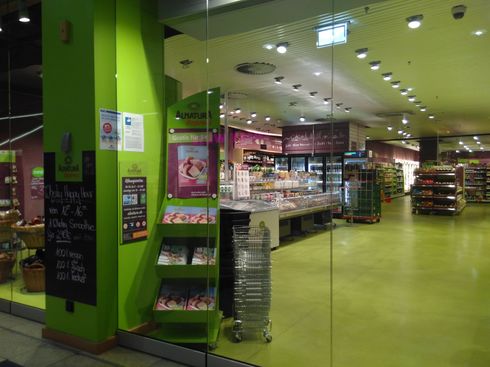
Your first option is a 100 percent organic supermarket near the Western entry of the mall: The nation-wide operating Alnatura chain is running one of the smaller Alnatura Express convenience stores for last minute provisions here. It can be reached easily from track 2 by a moving walkway. Downstairs turn right (facing away from the tracks), and there you'll easily spot the fresh-green coloured shop – a provider not only of all daily necessities, but also of fully organic snacks and coffee on the go.
For those who wish to refill their drinking bottle with tea or infusion, the "Tea(bag) of the week" comes at the unbeatable price of 1 EUR. The staff will happily fill your entire bottle with hot tea water if you ask nicely. Unfortunately opening hours on Sundays are limited to the afternoon.
When you find it closed do not despair: Next to it a Rossmann drugstore offers a good selection of organic dry goods, preserves, drinks and natural body care, though less than the DM branch mentioned below. If in a hurry you can buy the following brands without hesitation: "Alverde", "Sante", "Lavera", "Weleda" (toiletries), "EnerBio" and "Veganz" (food, the latter is entirely vegan). Since 2020 the range of environmentally friendlier household items has been on the rise: now you'll find the entire list of grandma's cleaning chemicals in the shelves, both citric and acetic acid as well as soda, beeswax food wraps and more, and in 2021 the company launched their own brand of environmentally certified range of cleaning products, "ecofreude".
The Eastern-most part of the mall (to the right when facing the tracks) houses a branch of the DM Drogeriemarkt
offering an abundance of certified organic dry goods, preserves, drinks, natural body care and eco-friendly household chemicals (see here for a detailed description), in short: everything you need while travelling except for fresh and frozen food.
Still in the East wing though more central you'll find a Vitalia wholefood market which in addition to dry goods, sweets and snacks, toiletries and detergents also sells fresh food: Here you can get organic bakery items and and sandwiches, fresh dairy products and a small selection of organic fresh fruit and veges. Prices here are more upmarket than at the DM branch, and you have to check for organic labels, too, though to a lesser extend. If in doubt the staff is more competent than the one in the drugstore superstores and they are two hours longer open on Sundays than the Alnatura.
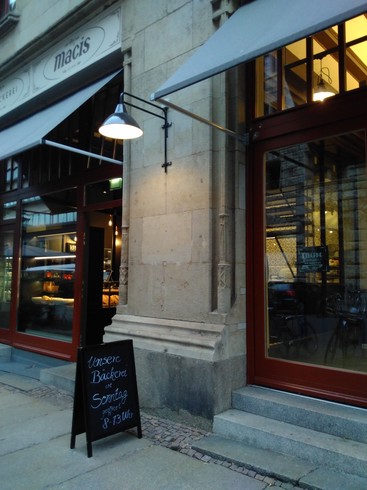
If in the mood for a good coffee a difficult question might bother the eco-conscious traveller: Should I have an organic coffee made by the coffee automat of the Alnatura snack bar or do I rather prefer a properly pressure-made yet conventional espresso in the beautiful bookshop cafe Ludwig on track level? I'd love to recommend the latter in this blog but organic ingredients are limited to organic syrup to flavour the coffee and iced tea of Coca Cola's organic brand "Honest". The coffee bar used to have organic apple spritzer but unfortunately no longer. With its beautiful ceiling the well-assorted bookstore however is worth visiting in its own right. While the book shop keeps open longer the cafe is closing at 6 pm.
City centre
If you have the time to take a stroll into the city centre, make sure to pay a visit to the bakery of the Macis restaurant a little south of the Thomaskirche yard with the famous Bach memorial, if only to marvel at the mouth-watering fully organic and skillfully decorated cakes and club sandwiches in the shop window. Unlike the organic convenience store next to it the bakery keeps open on Sunday mornings, and if you buy of their artisanal breads some organic butter is absolutely sufficient for a gorgeous picnic.
2024-01-05 13:30:00
[Leipzig, organic, vegan, gifts, snacks, lunch, supermarkets, grocery, trainstation, coffee, books, bakeries]
Link

Organic wholesale in the capital of Saxony (which is governed by a red-red-green coalition) used to be dominated by the local economy,
but since the oldest organic supermarket in town, Biosphäre, became part of the nation-wide Denn's chain in 2018, the picture has been resembling the one in other German metropolises: The market is devided between two local actors, a regional one and two of the nation-wide operating grocery chains, with a hand-full of smaller corner shops filling niches.
The largest density of organic supermarkets can naturally be found in the vibrant Wilhelminian style quarter of Neustadt north of the river Elbe with its – gentrification aside – still predominantly left-wing population of artists, students, activists, tourists, hipsters and bourgeois green-party voters.
Neustadt
It hasn't been always this way, but walking the old streets of Innere Neustadt with open eyes will present you with an abundance of shops and eateries boosting of vegetarian and vegan products. Many of them use organic produce, but won't advertise it – partially because they blend with conventional products, and use of organic ingredients will vary, partially in fear of being prejudged as expensive. Fortunately it is nowadays easier to find an organic supermarket in this neighbourhood
than a conventional one, so if you're tired of asking just walk to the next crossroad, and there you are.
The former Biosphäre markets are located here: the older one on Königsbrücker Landstraße opposite Schauburg theatre, and an even larger one in Alaunstraße a few metres from Albertplatz which replaced a conventional supermarket. Both have a self-service area where you can have coffee, cakes, pastry, sandwiches at any time of the day, and soups for lunch. Students are entitled a 10 percent discount on Wednesdays.
Recently the shop in Alaunstraße also took a small effort to support package-free shopping.
Berlin-based organic supermarket chain Bio Company has a branch a little south along the tramway tracks on Königsbrücker Landstraße. Just like the Denn's branches it closes at liberal 9 pm.
The Bio Company stores recently introduced fill-yourself stations with dry food and sweets. This shop offers more refill options that the one near Blaues Wunder bridge.
If you despair in face of the piles of plastics and paper wrappings you've been collecting while doing your regular shopping, re-use your glasses, containers and bags and refill them at Lose, a cosy zero-waste corner store in Böhmische Straße.
Altstadt
The Denn's Biomarkt chain not only took over the two former Biosphäre markets in the Neustadt but also opened a new supermarket within the Altmarktgalerie shopping mall.
Near
Bahnhof Mitte train station you'll find the main branch of VG Biomarkt, an organic co-operative which not only supports your zero-waste efforts but also sports its own organic fashion store.
Striesen, Blasewitz, Loschwitz, Johannstadt
The neighbourhoods along the river shore on the east side of town sport several branches of the zero-waste friendly VG Biomarkt food co-operative.
South of the Blaues Wunder bridge, local butcher's chain Vorwerk Podemus has one of its pleasant wholesale supermarkets.
First address for shortly travelled organic meat of animals which had a decent life. They also have branches in the neighbourhoods of Gruna, Neustadt, Alttolkewitz as well as a farmshop. While the Podemus shops do not offer food in gravity bins, they have been increasing their product range with jogurt, honey and jams in 250 ml deposit glasses lately. Make sure to return them in any organic supermarket.
Another option in the neighbourhood of Blasewitz is the second Bio Company branch in town. Just like in the Neustadt branch the bakery disk caters for the early bird from 7:30 am.
The only branch of a nation-wide operating organic grocery chain so far is Alnatura on tram hub Straßburger Platz which many locals still refer to by its old name from GDR times, "Fucikplatz".
Bühlau, Weißer Hirsch
To find fully organic groceries on top of the hillside North of the Blaues Wunder bridge, in the elegant residential area of Weißer Hirsch and adjacent Bühlau interestingly proves to be more difficult. What I found instead was the shop of a small-scale vegan manufacturer, Vegannett (a pun made of the words "vegan" and "nice", while the second part of the name also refers to the name of the owner-founder, Annett). On the premises of a former partially organic butcher's shop she prepares vegetable spreads which you can buy in many of the aforementioned supermarkets. But if you happen to be there on a Wednesday afternoon, pay a visit, taste and shop. In addition to the spreads you can also buy local honey. And the
best: Since 2022 the spreads have been coming in deposit glasses!
Klotzsche
If you fancy a stroll in the woods of Dresdner Heide or are on the way from or to the airport make sure to have sufficient time to visit the beautifully restored historical train station Klotzsche with its
Vorwerk Podemus supermarket and the organic station restaurant, both catering for the early bird.
Closed down
The following (partially) organic supermarkets do no longer exist although you will still find references to them on the web:
2024-01-05 12:00:00
[Dresden, Neustadt, organic, supermarkets, grocery, eatery, lunch, snacks, coffee, vegan, trainstation, farms, Elbe_cycle_route, Elberadweg]
Link

Sunday, 10 December 2023
For being home to so many sustainable and organic shopping opportunities Heidelberg has surprisingly few places serving organic food. The two I found are both very well suited for both, vegetarians and vegans, and essentially self-service, but I wasn't able to spot a single proper dinner restaurant where you're actually waited.
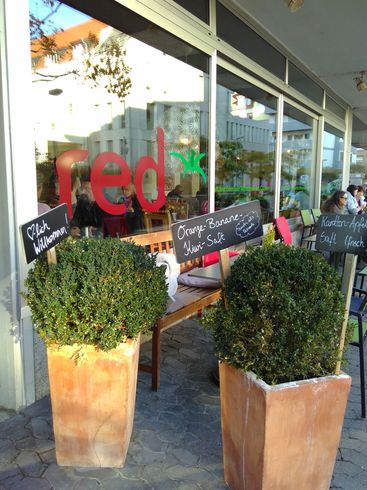
Both, lunch, snacks, coffee and dinner can be had at
red buffet restaurant, next to the Alnatura organic supermarket on the premises of a former swimming pool opposite the Schwanenteich park. You can choose between two lunch dishes at a fixed price or serve yourself salads and warm one-pot dishes (all 100 percent and certified organic, vegetarian and often vegan) and pay by weight.
Order drinks (cold drinks, teas or Italian-style coffee drinks) and predominantly vegan cakes and dessert at the cash desk while you pay, take your tray and find yourself a seat. For being an vegan-award winning restaurant I found the food quite uninspiring, without accentuated flavours, just good ingredients cooked together. Even the perfectly looking vegan hazelnut-espresso cake I had was missing a distinctive coffee flavour – good, but far from outstanding. Nevertheless the generally pleasant place was crowded (though not unpleasantly), perhaps due to missing alternatives. It's the only evening-open option for eating out, but closed on Sundays. You may also buy food to take with you.
The stylish yet positively unexcited Zeit für Brot bakery cafe in Hamburg is a pleasant neighbourhood spot for breakfast, lunch or a snack watching the bakers at work. So I was delighted to hear from niiebel that a new branch opened in
Heidelberg in autumn 2023, and hope it's equally pleasant. Cinnamon roll addicts will hopefully find a favourite among the different varieties.
Closed
The city of Heidelberg still lists the following place in its latest guide to organic and local food, but the place unfortunately closed two years ago:
2023-12-10 16:00:00
[Heidelberg, organic, lunch, coffee, cafe, eatery, vegan, vegetarian, restaurant]
Link













